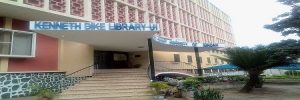The situation in academic libraries during the COVID-19 pandemic in Nigeria – one of the African countries hit hardest by the disease –is a mixed one.
Before the pandemic, activities with different services were provided as usual. For instance the Kenneth Dike Library, University of Ibadan (http://www.library.ui.edu.ng) offered 24 hour reading services for users (except during the morning and afternoon shift : (https://librarymap.ifla.org/stories/Nigeria/24-7-UNIVERSITY-LIBRARY-READING-ROOM-PROVIDES-EQUITABLE-ACCESS-TO-ENERGY-AND-INFORMATION/141). News of the pandemic came in February at a time when the library practically had to be run by library interns because of a nationwide strike action of the Academic Staff Union of Universities (ASUU). The interns had to end their stay in March when total pandemic lockdown came in full force.
In the 36 States of Nigeria, activities in academic libraries vary during the pandemic. Most academic libraries have been totally shut since March, 2020 with the staff in the technical units working from home. Where feasible, online library services are provided. Many quickly subscribed to Open Access materials such as those offered by publishers and educational facilities locally and abroad. Some private university libraries remain reasonably functional given the circumstances, but they offer reduced services. Physical contact must be avoided Only 25% of the usual number of clients and staff have access, and not permanently. They must maintain appropriate social distancing protocols.
There is little alternative for academic librarians than to conduct their researches from home and get online trainings. Webinars, workshops, conferences and seminars are being distributed via remote conferencing platforms. In addition, academic librarians individually and in collaboration with Non-Governmental Organisations (NGOs) are currently working on sensitization campaigns and information literacy programs. Conversations with a number of academic librarians revealed that the efforts towards providing services to patrons has been mainly through informal rather than institutional channels. Text messages, Facebook posts and WhatsApp chats, in collaboration with some Special libraries and NGOs are commonplace.
Some academic librarians especially in the Akwa Ibom State created volunteer groups in a “Community Roving Library/Literacy Development Project”. Children in the Internally Displaced Persons (IDP) camp have benefitted from such activities during lockdown. The negative impact of the COVID-19 on children’s education has been addressed by the group promoting reading culture, donating books, and empowering children to enjoy lifelong reading.
Heads of academic libraries are permitted to work, being members of the Management teams of their academic institutions. This is why it has been possible for the University of Lagos, Akoka, Nigeria to take delivery of robots donated to it by Platform Capital on the 29th of June, 2020. The use of robots, the first of its kind in any academic library in Nigeria, will be programmed to perform quick reference services, help users finding books, enhance book categorisation, track headcount and create a user friendly library. This will help reduce the risk of transmitting or contracting COVID-19 among staff and make the library a safe space for users.
Academic libraries in Nigeria will have now to cope with the “new normal” whatever the post-COVID future will be. As James O ’Donnell said, “we have for the most part left our buildings closed and dark while we together ride out the vital storm that has swept upon us”. The academic library narrative in Nigeria of 2020 is still on the ride. We’re riding the COVID-19 storm!
Further references :
- University of Idaban Website: https://www.ui.edu.ng/
- Nigeria on IFLA’s Library Map of the World
- WHO’s situation report as of July 12th 2020
- May announcement on easing the lockdown in Nigeria
Adetoun Adebisi Oyelude
University of Ibadan, Nigeria
Principal Librarian
Email: [email protected]

